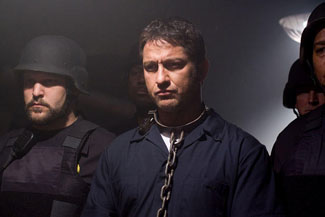|
|
Things I Learned from Movie X:
|

|
New at BOP: Share & Save
![]() Tweet
Tweet
![]() Print this column
Print this column
Eyewitness testimony is not a compelling form of evidence
In its attempts to show us the way that the law really works, Law Abiding Citizen reveals something surprising; witnessing a crime isn't useful for making a case against the perpetrators. Who knew? Aside from knowing that everyone hates Butler for having the temerity to lose his family in a vicious manner (seriously, what a tool!) Foxx's main justification for not allowing Butler on the stand is that he blacked out after witnessing it, and that the whole experience would have been so traumatic that his testimony wouldn't be believable. Now, I'm no fancy big city lawyer like Ray Charles, but that argument implies that no one who witnesses a crime can then stand up in court and provide evidence. If only he'd stayed awake throughout, or reacted impassively to everything that was going on around him, then they'd have a case.
Kids are so desensitized these days
After brutally torturing and killing the last of his family's murderers, Butler sends a recording of it to Foxx's house, where it is promptly watched by his young daughter. Then, later that evening, despite having watched a man get chopped up with a variety of tools, she's sleeping like a baby. Clearly, the reason why she watched some of the video, then cried out for her mother, was not because she was expecting something kid friendly and was terrified by what she saw, but because she was expecting Saw VI to come from Netflix and wanted to complain that they'd sent her the wrong disk.
|
Advertisement |
The system works! The system is broken! The system works because it's broken!
If Law Abiding Citizen has a point - and that is a huge "if" - it's that the justice system is broken. How else could a double-murderer get a plea bargain and escape execution? Realizing this fatal flaw, Butler displays some sound, reasonable logic by concluding that the best way to expose this problem is to kill, or at least try to kill, dozens of people, many of whom were only tangentially connected to the crime. After Butler kills the two men who murdered his family, and is subsequently arrested and sent to jail while Foxx tries to prove that he did it, he then kills the defense lawyer, the judge who presided over the case, and eventually people who are only remotely connected to the initial miscarriage of justice. Butler's plan is the equivalent of trying to fix a crack in a windshield by smashing it with a sledgehammer. And, because he commits most of his crimes whilst inside his cell and there's no evidence to link him to the deaths, Foxx is forced to break the law in order to stop him, first by breaking into a warehouse Butler owns, and ultimately (SPOILER) taking a bomb Butler intended to detonate in City Hall to kill the mayor (again, someone with no connection to the crime) and hiding it in his cell, causing Butler to accidentally kill himself in the final reel of the film. The message? The system is broken, but if you just keep breaking it it'll work eventually.
Andy Dufresne may have been innocent, but he was also lazy
Warning: Major spoilers. The mystery that drives most of the film revolves around just how Butler is killing people from inside his cell. Turns out that the answer is as simple as it is stupid; during the ten years that he planned his revenge on the outside, he built a tunnel beneath the prison in which he would later be imprisoned. And it's not just a little hole in the rock either, it's an actual tunnel with load bearing beams and hundreds of lights along the ceiling. I expected a troupe of singing dwarves to show up and be revealed as Butler's jolly accomplices. If that wasn't enough, the tunnel ends in a central chamber, from which he made secret holes in every single cell in the prison, so that no matter where he was put, he'd always be able to sneak out and do some killing. This begs the question; why did it take Andy Dufresne so long to dig his way out of Shawshank? Gerard Butler managed to dig a long, structurally sound tunnel, then dig into hundreds of cells, in half the time it took Dufresne to dig one measly tunnel that only had to get him to the sewer. Makes you wonder if Dufresne really wanted to get of prison at all if he did such a slow job of it.
Continued:
1
2
[ Email this column ]

|
|
|

|
Thursday, April 25, 2024
© 2024 Box Office Prophets, a division of One Of Us, Inc.

